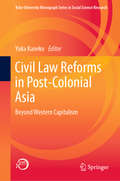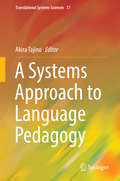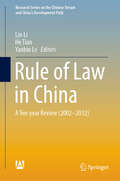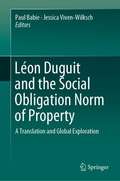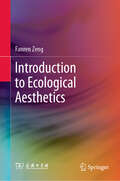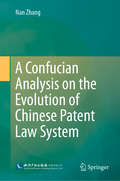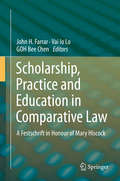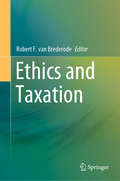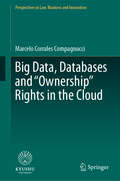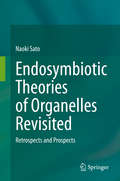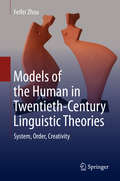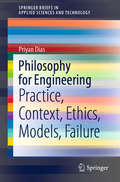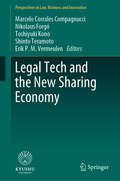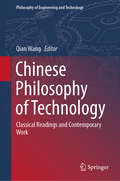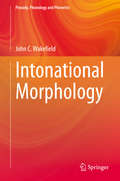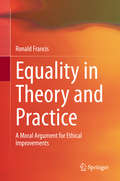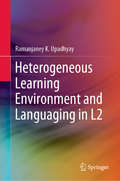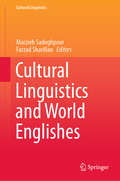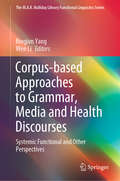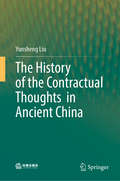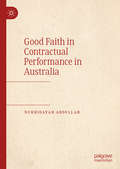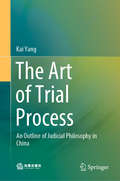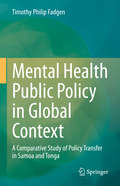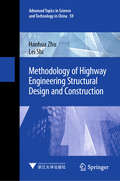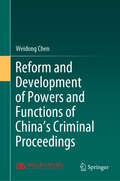- Table View
- List View
Civil Law Reforms in Post-Colonial Asia: Beyond Western Capitalism (Kobe University Monograph Series in Social Science Research)
by Yuka KanekoThis book focuses on the legal systems of the late-developing countries of ASEAN (Cambodia, Laos, Myanmar, and Vietnam, often referred to as the CLMV countries). These nations are apt to be placed in an economically disadvantageous situation within the opportunity of communalization of legal systems being advanced by the ASEAN Economic Community (AEC) launched in 2015, and the book clarifies the dynamics of the changes within these legal systems. Concurrently, there is an intention to analyze the “legal system development support” that has continued to be provided to these countries since the mid-1990s via international development support from international organizations and developed countries including Japan. In particular, the emphasis has been on the area of civil law, where the main subject of Japan’s support has been centered on the civil code and civil procedure code. The legal system of the recipient country is complicated by the crisscrossing of the remnants of previous eras, from the inherent laws that have existed since before colonization, the laws of the colonial powers that were introduced during the colonial era (French law in Cambodia, Laos, and Vietnam; English law in Myanmar), the influence of socialist law after independence from colonization, and the path of modern industrialization and development, such that one country's legal system is the combination of all of these influences. For the reader to understand the dynamics of these changing laws, each chapter of the book combines two methodological perspectives. The first is to ascertain the spatial range as to how far the civil law extends across social phenomena. The second is a historical perspective in which the trends in legal changes will be understood on a time axis.
A Systems Approach to Language Pedagogy (Translational Systems Sciences #17)
by Akira TajinoThis volume represents the first attempt in the field of language pedagogy to apply a systems approach to issues in English language education. In the literature of language education, or more specifically, second or foreign language learning and teaching, each topic or issue has often been dealt with independently, and been treated as an isolated item. Taking grammar instruction as an example, grammatical items are often taught in a sequential, step-by-step manner; there has been no “road map” in which the interrelations between the various items are demonstrated. This may be one factor that makes it more difficult for students to learn the language organically. The topics covered in this volume, including language acquisition, pedagogical grammar, and teacher collaboration, are viewed from a holistic perspective. In other words, language pedagogy is approached as a dynamic system of interrelations. In this way, “emergent properties” are expected to manifest. This book is recommended for anyone involved in language pedagogy, including researchers, teachers, and teacher trainers, as well as learners.
Rule of Law in China: A Ten-year Review (2002-2012) (Research Series on the Chinese Dream and China’s Development Path #1)
by Lin Li He Tian Yanbin LvThis volume summarizes the achievements on rule of law in China for the ten years from 2002 to 2012, particularly focusing on areas such as judicial review, anti-monopoly, reform of government agencies, the circulation of rural Land contracted management rights, and the protection of children’s rights. It also considers the prospects for rule of law in China in the future. With numerous tables and screenshots to illustrate the text and provide a comprehensive overview and insights into China’s rule of law establishment, it appeals to readers interested in judicial reform, rural medical service, children’s rights protection and anti-monopoly.
Léon Duguit and the Social Obligation Norm of Property: A Translation and Global Exploration
by Paul Babie Jessica Viven-WilkschThis book demonstrates the importance of Léon Duguit for property theory in both the civil and common law world. It translates into English for the first time ever Duguit’s seminal lecture on property, the sixth of a series given in 1911 in Buenos Aires. It also collects essays from the leading experts on the social function of property in major civil and common law jurisdictions internationally.The book explores the importance that the notion of the social function of property has come to have not only in France but in the entire civil law tradition, and also considers the wide – if un-attributed and seldom regarded – influence in the common law tradition and theory of property.
Introduction to Ecological Aesthetics
by Fanren ZengThis book explores in detail the issues of ecological civilization development, ecological philosophy, ecological criticism, environmental aesthetics, and the ecological wisdom of traditional Chinese culture related to ecological aesthetics. Drawing on Western philosophy and aesthetics, it proposes and demonstrates a unique aesthetic view of ecological ontology in the field of aesthetics under the direct influence of Marxism, which is based on the modern economic, social cultural development and the modern values of traditional Chinese culture.This book embodies the innovative interpretation of Chinese traditional culture in the Chinese academic community. The author discusses the philosophical and cultural resources that can be used for reference in Chinese and Western cultural tradition, focusing on traditional Chinese Confucianism, Taoism, Buddhism and painting art, Western modern ecological philosophy, Heidegger's ontology ecological aesthetics, and British and American environmental aesthetics.In short, the book comprehensively discusses the author's concept of ecological ontology aesthetics as an integration and unification of ontology aesthetics and ecological aesthetics. This generalized ecological aesthetics explores the relationship between humans and nature, society and itself, guided by the brand-new ecological worldview in the post-modern context. It also changes the non-beauty state of human existence and establishes an aesthetic existence state that conforms to ecological laws.
A Confucian Analysis on the Evolution of Chinese Patent Law System
by Nan ZhangThis book comprehensively discusses the main features of the Chinese patent law system, which not only legally ‘transplants’ international treaties into the Chinese context, but also maintains China’s legal culture and promotes domestic economic growth. This is the basis for encouraging creativity and improving patent law protection in China. The book approaches the evolution of the Chinese patent system through the ancient Chinese philosopher Confucius’s classic principle, offering readers a fresh new way to understand and analyze Chinese patent law reforms, while also outlining how Confucian insights could be used to improve the enforcement of patent law and overall intellectual property protection awareness in China. It examines ancient Chinese innovation history, explores intellectual property from a Confucian perspective, and discusses the roots of Chinese patent law, as well as the past three amendments and the trends in the ongoing fourth amendment. In addition to helping readers grasp the mentality behind the Chinese approach to patent law and patent protection, the book provides an alternative research methodology and philosophical approach by demonstrating Confucian analysis, which provides a more dynamic way to justify intellectual property in the academic world. Lastly, it suggests future strategies for local industries in the legal, cultural and sociological sectors in China, which provide benefits for domestic and overseas patent holders alike. The book offers a valuable asset for graduate students and researchers on China and intellectual property law, as well as general readers interested in Asian culture and the philosophy of law.
Scholarship, Practice and Education in Comparative Law: A Festschrift in Honour of Mary Hiscock
by John H. Farrar Vai Io Lo Bee Chen GohThis book examines how law functions in a multitude of facets and dimensions. The contributions shed light on the study of comparative law in legal scholarship, the relevance of comparative law in legal practice, and the importance of comparative law in legal education. The book will particularly appeal to those engaged in the teaching and scholarship of comparative law, and those seeking to uncover the various significant dimensions of the workings of law. The book is organised in three parts. Part I addresses scholarship, with contributors examining comparative legal issues as critique and from a theoretical framework. Part II outlines practice, with contributors discussing the function of comparative law in such comparatively diverse areas as international arbitration, environment, and the rule of law. Part III appraises comparative law in education.
Ethics and Taxation
by Robert F. van BrederodeThis book does not present a single philosophical approach to taxation and ethics, but instead demonstrates the divergence in opinions and approaches using a framework consisting of three broad categories: tax policy and design of tax law; ethical standards for tax advisors and taxpayers; and tax law enforcement. In turn, the book addresses a number of moral questions in connection with taxes, concerning such topics as: • the nature of government • the relation between government (the state) and its subjects or citizens • the moral justification of taxes• the link between property and taxation• tax planning, evasion and avoidance • corporate social responsibility• the use of coercive power in collecting taxes and enforcing tax laws • ethical standards for tax advisors • tax payer rights • the balance between individual rights to liberty and privacy, and government compliance and information requirements • the moral justification underlying the efforts of legislators and policymakers to restructure society and steer individual and corporate behavior.
Big Data, Databases and "Ownership" Rights in the Cloud (Perspectives in Law, Business and Innovation)
by Marcelo Corrales CompagnucciTwo of the most important developments of this new century are the emergence of cloud computing and big data. However, the uncertainties surrounding the failure of cloud service providers to clearly assert ownership rights over data and databases during cloud computing transactions and big data services have been perceived as imposing legal risks and transaction costs. This lack of clear ownership rights is also seen as slowing down the capacity of the Internet market to thrive. Click-through agreements drafted on a take-it-or-leave-it basis govern the current state of the art, and they do not allow much room for negotiation. The novel contribution of this book proffers a new contractual model advocating the extension of the negotiation capabilities of cloud customers, thus enabling an automated and machine-readable framework, orchestrated by a cloud broker.Cloud computing and big data are constantly evolving and transforming into new paradigms where cloud brokers are predicted to play a vital role as innovation intermediaries adding extra value to the entire life cycle. This evolution will alleviate the legal uncertainties in society by means of embedding legal requirements in the user interface and related computer systems or its code. This book situates the theories of law and economics and behavioral law and economics in the context of cloud computing and takes database rights and ownership rights of data as prime examples to represent the problem of collecting, outsourcing, and sharing data and databases on a global scale. It does this by highlighting the legal constraints concerning ownership rights of data and databases and proposes finding a solution outside the boundaries and limitations of the law. By allowing cloud brokers to establish themselves in the market as entities coordinating and actively engaging in the negotiation of service-level agreements (SLAs), individual customers as well as small and medium-sized enterprises could efficiently and effortlessly choose a cloud provider that best suits their needs. This approach, which the author calls “plan-like architectures,” endeavors to create a more trustworthy cloud computing environment and to yield radical new results for the development of the cloud computing and big data markets.
Endosymbiotic Theories of Organelles Revisited: Retrospects and Prospects
by Naoki SatoThis book re-examines the endosymbiotic theory, and presents various related theories and hypotheses since the first proposal in 1905 by a Russian biologist. It also demonstrates that Lynn Margulis’s contribution to the current endosymbiotic is less than sometimes thought, and presents a plausible idea on how the organelles were formed. Explaining that Margulis’s initial work did not intend to show the endosymbiotic origin of chloroplasts and mitochondria, the book discusses their endosymbiotic origin in the light of current biology with the help of clear visual images. Further, by including numerous historical facts and details of phylogenetic analyses using recent genomic data that are largely unknown to many in the field, it offers deep insights into the history of biology, phylogenetic analysis, and the new evolutionary thinking. 2017 was the 50-year anniversary of Margulis’s first paper in the Journal of Theoretical Biology, and 2020 will mark 50 years since the publication her famous work Origin of Eukaryotic Cells, and as such this book offers a timely reconsideration ofthe works of Lynn Margulis and the endosymbiotic origin of organelles.
Models of the Human in Twentieth-Century Linguistic Theories: System, Order, Creativity
by Feifei ZhouThis book provides a refreshingly new perspective for investigating linguistic texts, which foregrounds models of the human. It presents a close reading of major linguistic theories in the twentieth century with a focus on three main themes: linguistic system and the individual speaker; social order; and linguistic creativity. The examination of these three fundamental themes concerning language and human nature, on the one hand, provides a fine-textured exposition on the implicit and explicit models of human nature endorsed by major theorists; on the other, it reveals the methodological dilemmas faced by linguistics. In light of the fact that the importance of considering posthumanist ideas is increasingly being underscored today, both within and outside linguistics, this focus on the human makes the book highly topical.
Philosophy for Engineering: Practice, Context, Ethics, Models, Failure (SpringerBriefs in Applied Sciences and Technology)
by Priyan DiasThis book highlights the unique need for philosophy among engineers, which stems from issues regarding their knowledge (epistemology), role or being (ontology) and influence (ethics). It discusses practice, context, ethics, models and failure as key aspects of engineering, and provides an easy but essential introduction to philosophy for engineers by presenting four key philosophers and linking them to these aspects: Karl Popper (failure), Thomas Kuhn (models), Michael Polanyi (practice & ethics) and Martin Heidegger (context & ethics). Popper, Kuhn and Polanyi are philosophers of science (epistemologists) who have challenged the view that science is a ‘cool, detached’ discipline, since it also depends on human imagination (Popper), consensus (Kuhn) and judgment plus artistry (Polanyi); factors that are central to engineering. Heidegger (an ontologist) critiqued technology on the one hand (ethics), but also stressed the importance of ‘doing’ over ‘knowing,’ thus ‘authenticating’ the highly pragmatic engineering profession. Science is the ‘core’ component of engineering, which is overlaid by a variety of heuristics . Practice-based knowledge can be formalized, with artificial intelligence (AI) offering a valuable tool for engineering, just as mathematics has done for science. The book also examines systems thinking in engineering. Featuring numerous diagrams, tables and examples throughout, the book is easily accessible to engineers.
Legal Tech and the New Sharing Economy (Perspectives in Law, Business and Innovation)
by Toshiyuki Kono Nikolaus Forgó Marcelo Corrales Compagnucci Shinto Teramoto Erik P. M. VermeulenThe exponential growth of disruptive technology is changing our world. The development of cloud computing, big data, the internet of things, artificial intelligence, machine learning, deep learning, and other related autonomous systems, such as self-driving vehicles, have triggered the emergence of new products and services. These significant technological breakthroughs have opened the door to new economic models such as the sharing and platform-based economy. As a result, companies are becoming increasingly data- and algorithm-driven, coming to be more like “decentralized platforms”. New transaction or payment methods such as Bitcoin and Ethereum, based on trust-building systems using Blockchain, smart contracts, and other distributed ledger technology, also constitute an essential part of this new economic model. The sharing economy and digital platforms also include the everyday exchange of goods allowing individuals to commodify their surplus resources. Information and innovation technologies are used in order to then match these resources with existing demand in the market. Online platforms such as Airbnb, Uber, and Amazon reduce information asymmetry, increase the value of unused resources, and create new opportunities for collaboration and innovation. Moreover, the sharing economy is playing a major role in the transition from exclusive ownership of personal assets toward access-based exploitation of resources. The success of online matching platforms depends not only on the reduction of search costs but also on the trustworthiness of platform operators. From a legal perspective, the uncertainties triggered by the emergence of a new digital reality are particularly urgent. How should these tendencies be reflected in legal systems in each jurisdiction? This book collects a series of contributions by leading scholars in the newly emerging fields of sharing economy and Legal Tech. The aim of the book is to enrich legal debates on the social, economic, and political meaning of these cutting-edge technologies. The chapters presented in this edition attempt to answer some of these lingering questions from the perspective of diverse legal backgrounds.
Chinese Philosophy of Technology: Classical Readings and Contemporary Work (Philosophy of Engineering and Technology #34)
by Qian WangThis book gathers essays that introduce the ideological advances in the philosophy of engineering and technology in contemporary China. It particularly focuses on China’s distinctive concepts and methods, revealing different views and academic debates to offer readers a comprehensive overview of this important field.The contributors present unique perspectives based on practical problems and traditional philosophy, examining such issues and concepts as axiology and theories of process, the difference between engineering activities and technology activities, and the core of the relationship between “Dao” and “Technique.”Other essays cover the ethics of technology, practical wisdom (phronesis) and practical reasoning, as well as creative concepts and methods concerning the philosophical problems in high technology, architectural technology, and technological innovation. The authors also consider more general issues in the field.This book compiles the relevant research achievements of Chinese scholars in various time periods. Some authors have revised and translated into English papers published in Chinese, while others present their research in English specifically for this study. An annotated bibliography of the major publications in the field completes this collection.
Intonational Morphology (Prosody, Phonology and Phonetics)
by John C. WakefieldThis book discusses the morphological properties of intonation, building on past research to support the long-recognized relationship between the functions and meanings of discourse particles and the functions and meanings of intonation. The morphological status of intonation has been debated for decades, and this book provides evidence from the literature combined with new and compelling empirical evidence to show that specific intonational forms correspond to specific segmental discourse particles. Based on the conclusion that intonation is in the lexicon, it proposes syntactic positions for intonational meanings using a cartographic approach. It also describes how intonation is represented in speakers' minds, which has important implications for first and second language acquisition as well as for theories and approaches to artificial speech recognition and production. This book is of interest to theoretical and applied linguists, as well as to anyone whose research and interests relate in any way to intonation.
Equality in Theory and Practice: A Moral Argument for Ethical Improvements
by Ronald FrancisThis book is an account of the concept of equality from the perspective of both theory and practice, and presents methods of quantifying values. It considers both arguments and evidence, and tackles equality in its different forms, including economic equality, education, equality before the law, equality of opportunity, and gender equality. The book shows that inequality is a profoundly moral question, noting that there are good practical reasons for its adoption. It presents a consideration of classical theories from Aristotle to Hume, as well as contemporary approaches such as those offered by Rawls, Haidt, Temkin, and Parfit. It also contemplates issues such as the naturalistic fallacy, and considers what is different about the Goleman view of moral sensitivity and the ethical personality. The array of evidence includes the impact of climate and various plants such as sugar and cotton on the slave trade, the concept of Gaia, Darwinism, sex inequality, personality, culture, psychological issues, and the quantification of ethics. The book concludes with some practical suggestions for improving equality. It aims to raise awareness of the ways in which equality can be understood, and achieved. It will be relevant to students and scholars in philosophy, human rights, and law.
Heterogeneous Learning Environment and Languaging in L2 (Springerbriefs In Education Ser.)
by Ramanjaney K. UpadhyayThis book explores heterogeneity in the Indian academic setting. Presenting a study on the performance of Bachelor of Engineering students from various parts of the county, it analyzes the subjects’ language skills on the basis of selected sociolinguistic variables and examines the possible role/impact of using multiple languages in the communicative setting described. In turn, the book investigates the differences between the way language is viewed in the Orient and in the Western world, and how, despite their differences, these views lead to similar language teaching methods in both worlds. It also highlights the limitations of current theories and frameworks in terms of accommodating modern methods of assessing language skills. Addressing socio-pragmatic issues in terms of English proficiency and language assessment, it is the first book to offer such a focused and detailed discussion of these varied but related issues, making it a valuable resource for all scholars and researchers working in the areas of socio-pragmatics, language assessment, and intercultural communication.
Cultural Linguistics and World Englishes (Cultural Linguistics)
by Marzieh Sadeghpour Farzad SharifianThis book investigates the study of World Englishes from the perspective of Cultural Linguistics, a theoretical and analytical framework for cultural cognition, cultural conceptualisations and language that employs and expands on the analytical tools and theoretical advancements in a number of disciplines, including cognitive psychology/science, anthropology, distributed cognition, and complexity science. The field of World Englishes has long focused on the sociolinguistic and applied linguistic study of varieties of English. Cultural Linguistics is now opening a new venue for research on World Englishes by exploring cultural conceptualisations underlying different varieties of English. The book explores ways in which the analytical framework of Cultural Linguistics may be employed to study varieties of English around the globe.
Corpus-based Approaches to Grammar, Media and Health Discourses: Systemic Functional and Other Perspectives (The M.A.K. Halliday Library Functional Linguistics Series)
by Bingjun Yang Wen LiThis edited volume gathers corpus-based studies on topics including English grammar and discourses on media and health, mainly from a systemic functional linguistics (SFL) perspective, in order to reveal the potential of SFL, which has been emphasized by Halliday. Various other perspectives, such as philosophy, statistics, genre studies, etc. are also included to promote SFL’s potential interaction with other theories. Though they employ a diverse range of theoretical perspectives, all the chapters focus on exploring language in use with the corpus method. The studies collected here are all original, unpublished research articles that address significant questions, deepen readers’ understanding of SFL, and promote its potential interaction with other theories. In addition, they demonstrate the great potential that SFL holds for solving language-related questions in a variety of discourses.
The History of the Contractual Thoughts in Ancient China
by Yunsheng LiuThis book explores the intellectual history of contract law in ancient China by employing archaeological and empirical methodologies. Divided into five chapters, it begins by reviewing the origin of the contract in ancient China, and analyzing its name, primary form, historical premise and functions. The second chapter discusses free will and lawfulness in the establishment of a contract, offering insights into the impact of contracts on social justice. In turn, the third chapter addresses the inner core of the contract: validity and liability. This allows readers at all levels to identify the similarities and differences between contracts from different eras and different parts of the world, which will also benefit those pursuing comparative research in related fields. Chapters four and five offer a philosophical exploration of contract history in ancient China, and analyze key aspects including human nature and ethical justice.
Good Faith in Contractual Performance in Australia
by Nurhidayah AbdullahThis book gives a detailed account of the current state of the law concerning good faith in contractual performance in Australia, through an empirical study on its reception and development across the various Australian jurisdictions.In Australia, good faith received wide attention after Priestly J introduced in his obiter comments in Renard Construction (ME) v Minister for Works (1992) 26 NSWLR 234.This book focuses on the attitude of the judges to good faith, the definition of good faith, and the possibility of legislating a good faith obligation in Australian contract law. This book also discusses the issues surrounding its development, its meaning, and acceptance at the international level.The empirical legal research adopted in this book will offer a significant contribution in understanding the concept of good faith in Australia from the empirical perspective.
The Art of Trial Process: An Outline of Judicial Philosophy in China
by Kai YangThis book focuses on the reality of China’s modern judiciary, systematically demonstrating and discussing the judicial philosophy and judicial ethics as applied by Chinese courts and judges. In order to illustrate the methods of jurisprudence and sociology of law in the context of China’s judicial practice and practicability of applicable laws, it also addresses judicial methodology and Chinese judges' trial methods. Based on comparative study and aiming at global judicial reform, the book provides valuable guidance and insights for readers pursuing a detailed understanding of modern Chinese judiciary, Chinese judges and Chinese rule of law. The book is intended to primarily serve the need of legal professionals around the world, in particular those who are interested in China’s judicial system.
Mental Health Public Policy in Global Context: A Comparative Study of Policy Transfer in Samoa and Tonga
by Timothy Philip FadgenThis book explores the development of mental health systems in the Pacific Island Countries (PICs) of Samoa and Tonga through an examination of several policy transfer events from the colonial to the contemporary. Beginning in the 1990s, mental health became an area of global policy concern as reflected in concerted international organisation and bilateral aid and development agendas, most notably those of the World Bank, World Health Organization, and the governments of Australia and New Zealand. This book highlights how Tonga and Samoa both reformed their respective mental health systems during these years, after relatively long periods of stagnation.Using recent scholarship concerning public policy transfer, this book explains these policy outcomes and expands it to include consideration of the historical institutional dimensions evidenced by contemporary mental health systems. This book considers three distinct levels of policy implicated in mental health system transfer processes from developed to developing nations: colonial authority and influence; decolonisation processes; and the global development agenda surrounding health systems. In the process, the author argues that there are in fact three levels of policy change that must be accounted for in examining contemporary policy change. These policy levels include formal policy transfers, which tend to be prescriptive, involving professional problem construction and the designation of appropriate state apparatus for curative or custodial care provision; quasi-formal transfers, which tend to be aspirational and involve policy instruments developed through collaborative, participatory processes; and informal transfers that tend to be normative and include practices by professional actors in delivering service merged with traditional cultural beliefs as to disease aetiology as well as reflecting a deep understanding of the cultural context within which the services will be delivered. This book argues that a renewed focus on the importance of public policy and government institutional capacity is necessary to ensure human rights and justice are secured.
Methodology of Highway Engineering Structural Design and Construction (Advanced Topics in Science and Technology in China #59)
by Hanhua Zhu Lei ShiThis book mainly studies the methodologies of structural design and construction for highway engineering, which are applicable to the overall control and the precise operation of engineering structures. It explores the method of comprehensive analysis, the simplification of complex problems, and the application of typical engineering tools. In turn, the book presents a number of innovative approaches, e.g. the coordinated control of structural deformation method, the theory of underground engineering balance and stability, and the soft soil foundation treatment of “bumping at the bridgehead.” These methodologies are then illustrated in typical cases and representative problems, explained from a practical standpoint. Examples in special settings are also discussed, e.g. highway construction in Tibet, and rebuilding after the Wenchuan earthquake. The book offers a valuable reference guide for all those whose work involves highway engineering design, construction, management, and scientific research.
Reform and Development of Powers and Functions of China's Criminal Proceedings
by Weidong ChenThis book addresses the basic theory of criminal procedure in China, together with recent reforms. Balancing the powers of public security and judicial organs with the rights of individual citizens, it assesses the nature of Chinese criminal proceedings. In the basic theoretical research section, the author, drawing on the latest findings from the legal community, systematically and comprehensively presents the current trends, main research topics and the main problems that should be explored in future research into criminal procedure law in China; further, the author explains the basic thinking behind the revision of criminal procedure law, and the allocation of judicial resources in criminal procedure and criminal justice. The policy, basic theory and operation problems of judicial power, procuratorial power, police power, defense power and judicial reform are subsequently explained and evaluated. The general writing style used is intentionally straightforward, making the book easily accessible for the readers. Based on the author’s substantial working experience in the area of criminal law, it offers a highly intuitive reading experience.
